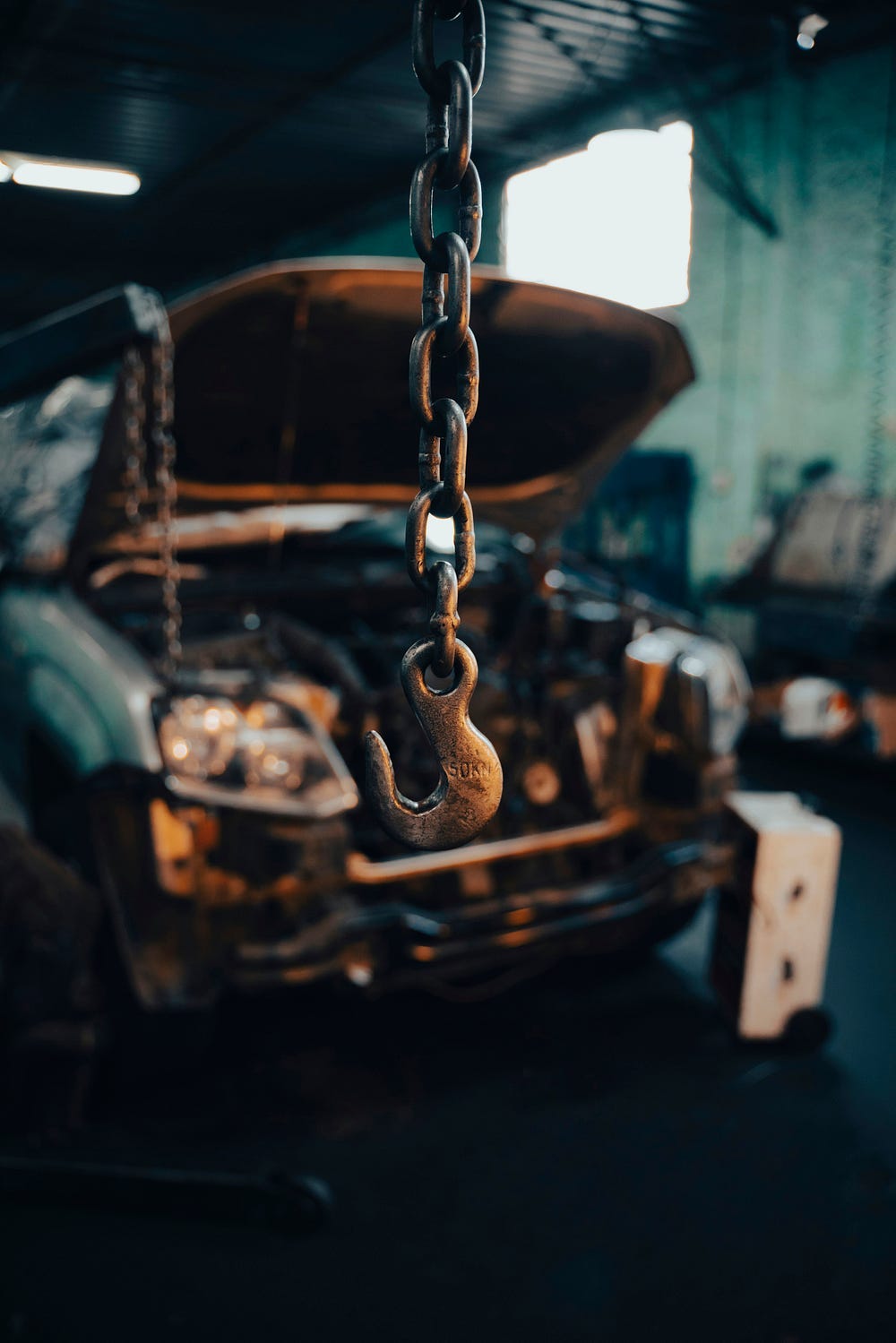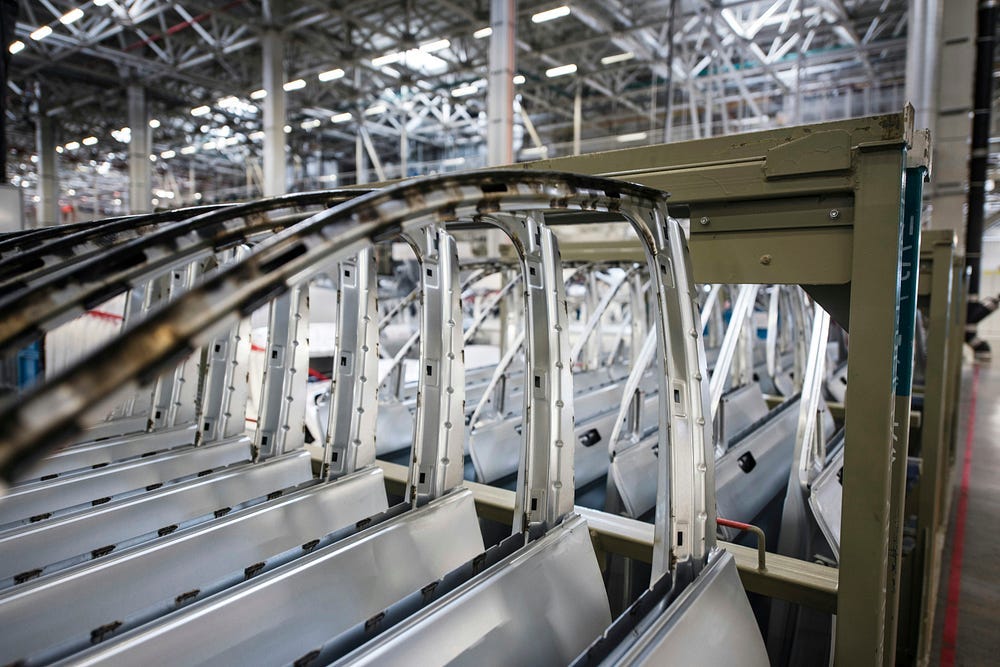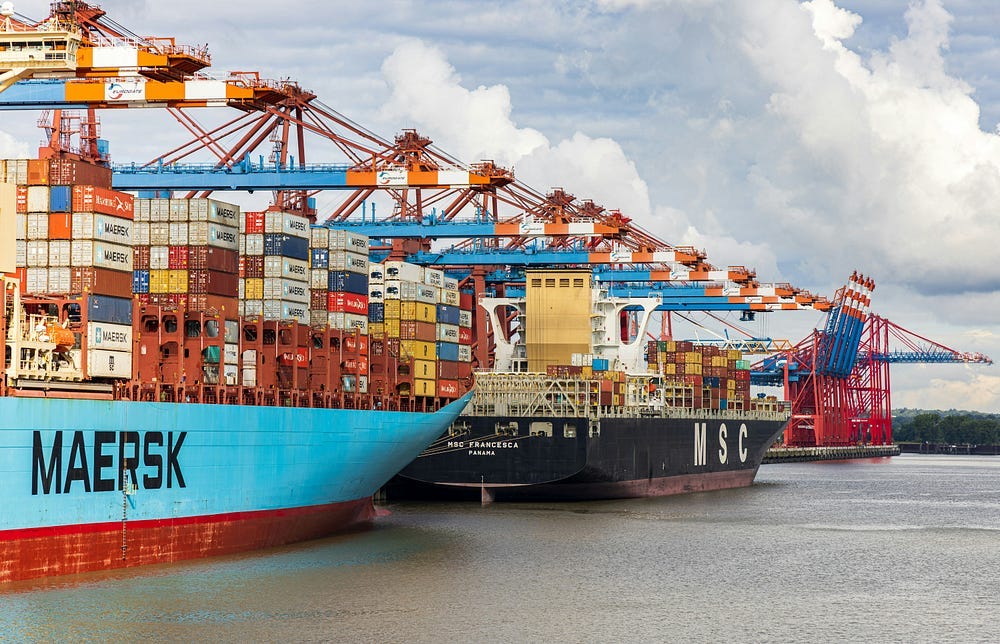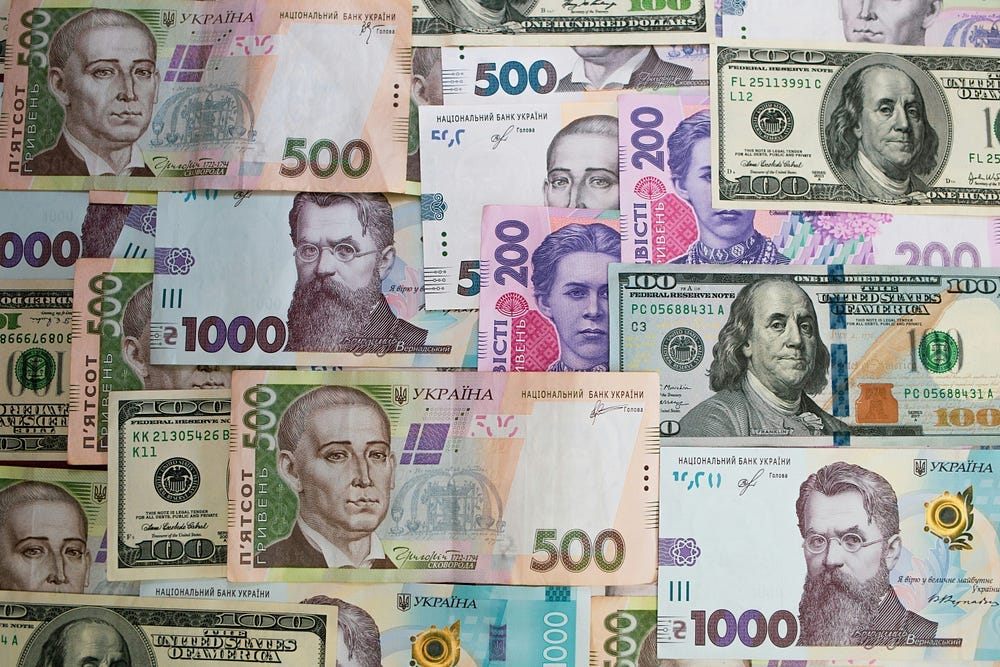Throwing the Monkey Wrench Into the System
How increasing economic instability signals a tipping point from growth into decline

Stability is a key factor in both maintaining and expanding economic output. That stability has become a thing of the past, though. The resulting uncertainty not only made future investments extremely risky, but now threatens to upend the entire economic world order. The loss of economic stability signals more than a passing recession, though: It is as much a cause as a symptom of the global economic system reaching its tipping point, marking an end to centuries of growth.
Thank you for reading The Honest Sorcerer, and special thanks to those who already support my work: without you this site could not exist. If you are new here and would like to see more in depth analysis of our predicament, please subscribe for free, perhaps consider a paid subscription. You can also support my work by virtually inviting me for a coffee, or sharing this article with a friend. Thank you in advance!
Policy makers in their efforts to maintain ‘normalcy’ (economic growth, stable prices, reliable supply chains etc.) have completely missed the fact that this ‘normalcy’ was anything but. The relentless expansion of economic activity over the past century was in fact a historical anomaly. But not only the rate of growth was unsustainable throughout the past decades, but also the resulting level of consumption; as both were predicated on a steadily increasing draw-down of non-renewable mineral resources. Yet, 99.999% of humanity still remains in denial saying: ‘This cannot possibly happen to us!’ They act like the proverbial person jumping off a skyscraper reassuring themselves: ‘Ninety-nine floors… So far so good!’ Something has to give, though. Material and energy consumption simply cannot grow forever. And as the saying goes: that which is unsustainable will not be sustained... The question is, how do we know that we have reached the tipping point, where centuries of growth turns into a permanent decline?
Just like with any complex adaptive system, from living organisms to Earth’s climate or the global economy, things get increasingly wobbly at the turning point from growth to decline. The end of growth in such systems is much like leaning back in your chair: on the rising side of the action things are fully under your control, setbacks can quickly recovered from, and even a total reset (back to a fully upright position) can be managed easily. However, when the tipping point is getting closer, it’s becoming harder and harder to maintain balance, recovery takes much longer and your future prospects look riskier than ever. Pushing things just a little too far risks an unstoppable fall. Falsely believing that you are not at the tipping point yet therefore comes with much larger risks than doing business as usual.
Rising economic volatility, uncertainty, complexity and ambiguity (VUCA in short) thus should not be treated as a cause of concern for CEOs only, but also as a sign of the world economy approaching a tipping point from growth to decline. The very fact that this term was coined more than a decade ago, should serve as a warning that this is not just a passing affair. But how does this increasing instability affects companies in real life? Why does the loss of stability and predictability pose a grave threat to the world economy as a whole?

A first hand account
I have been working in manufacturing, supply chain and procurement roles for the better half of my career in both managerial as well as in process improvement roles. One thing that stood out for me over the past two decades was how stable conditions allowed companies to plan ahead and how it made things much more efficient. Stability made next year’s procurement and production figures, inventory and sales volumes possible to predict with high certainty; based on which investment plans (buying machines, developing a new product generation, factory floor expansion etc.) and headcount plans could be made easily. Periods of stability thus allowed not only for increased efficiency, but also for effective and lasting growth.
Let’s take a concrete example and say that you are the head of global production in a car manufacturing company. In this rather simplified example you have to ensure that your plants have enough sheet steel and paint to make the chassis from, as well as all of the electrical and mechanical components needed to turn lumps of metal into actual vehicles. Think: seats, windscreens, engines, steering columns, break systems, gearboxes, wheels fitted with tires and a myriad of micro-controllers, sensors, wire harnesses etc. — all sourced from external suppliers. (Yes, car manufacturing is really nothing more than assembling LEGO pieces, with much of the technology developed by tier 1 and tier 2 suppliers, except perhaps for the engine which is usually made by an engine manufacturing plant of your car company.)
In a stable economic environment all of your providers know how much they will have to pay next year for copper, plastic granules, glass, steel, aluminum etc., raw materials, from which they make the car components you need. Thanks to the stable global economic environment your suppliers can calculate a competitive price for you, at which they can optimize their sales volumes and profits. They are doing so in a competitive arena where every car maker (ideally) has multiple suppliers to every single component (windscreens, gearboxes, seats etc.). Thanks to this competition and the resulting annual price negotiations you can factor in efficiency gains and cost reductions (made by your suppliers) into your own prices, offering rebates and a competitive price for your vehicle. In such a well balanced and optimized system profits are evenly distributed across the entire six continent supply chain, everybody can plan ahead, make investments, design new products, expand production and so on. Energy, environmental and material limits permitting this “little” global manufacturing ecosystem of yours could thus grow and flourish.

Compare this with a situation where both the prices of inputs (raw materials and energy) and the prices you can sell your product at is subject to great volatility. In order to prevent making a loss, your suppliers begin to hedge their bets. They set their prices far above expected raw material inflation levels, and/or start to build stocks of said materials, which in turn ties up their investment capital and warehouse space. Alternatively, they begin to set prices on a weekly / monthly basis putting the burden of calculating with volatility on your shoulders.
You, as a production manager do not accept this, of course, and insist on lower prices, which (if you are aggressive enough) results in your supplier base being forced to swallow the potential losses. They are then either go bankrupt after a few years or decide to move into countries where labor — the only thing they can really cut cost on — is much cheaper. (Which practically means moving into South-East Asia or North Africa… If you hoped that production will move into America where labor is even more expensive, then think again.)
Now, here comes the monkey wrench falling right into the massive gearbox of your immensely complex, six continent supply chain already sputtering from a great deal of price uncertainty: tariffs. As I and others explained: tariffs are really nothing but taxes payed by the import company, and not something punishing the supplier residing in the country of origin. For them, practically nothing changes. If the importer has leverage (they can buy a similar product in adequate quantities elsewhere) then they can ask for a discount from their suppliers. More often than not, however, importers find that there are insufficient spare capacity to fill in the void (or the product is specialized enough not to have an alternative) and so they have to pass on this extra cost onto you.

The funny thing about tariffs, and the greatest source of instability, is that they can be withdrawn just as fast as they were enacted. Why, how do you (or any of the production managers at your supplier base) know that the same tariffs will be here tomorrow, let alone next year? Why would your suppliers help you by relocating production into your country at an immense cost, if tariffs could be halved or erased next week? You see building factories, moving production equipment, hiring then training workers require a great deal of commitment and an extremely large investment in time and money. Such an endeavor takes years, not weeks or months.
So, given the above circumstances, what can you as a global production manager of a large automotive company do? Since tariffs are non-negotiable at your level (unless you are wealthy enough to fund think tanks and buy politicians) the only thing you can do is to raise your vehicle’s selling prices to match the similarly tariff-burdened prices of your competitors (1). This way you can at least finance the tariffs paid after your imported components (gear boxes, windshields, steering columns etc.), as well as the increased cost of steel (much of it imported) from which your factories make the chassis of the vehicle.
As a result of all this volatility and uncertainty, the vehicle now costs twice as much to make than two decades ago, but such is life… The problem is, that during these past two decades you have fired many of your workers in a frenzy to outsource as many activities you can, and who remained saw their wages stagnate; even as the cost of housing, food, healthcare and tuition kept rising. So while the wealthy 10% could still spend on whatever they want (tariffs or not), thanks to the increased returns on their wealth, the vast majority of the US consumer base had to tighten their belts and postpone buying big ticket items, such as a new car. Now add in the fact that many of them were fired recently from government positions (thanks, DOGE!) and you start to appreciate how a 2.8% fall in GDP is actually not a bad outlook after all…
You see, its not only companies who prefer price (and an overall economic) stability, but consumers as well. So much so, that they would rather forgo 5% of their spending than endure such high levels of economic instability, inflation and recurring recessions. In the economy everything is connected, and nobody can escape the consequences of past actions — were those intended or not. And while the recent madness of imposing tariffs left and right is entirely at fault of an uneducated leadership class, the much increased volatility of raw material and energy inputs are due to something entirely different. Something entirely out of human control.

A geological reality
Mining companies face the same dilemma as car manufacturers when it comes to instability, but on a much broader scale. Firms responsible for producing all the necessary raw materials and energy — from copper and iron to coal and crude oil — have to make investment decisions decades ahead. Exploration and building mines or drilling oil wells costs millions of dollars. Such decisions have to be based on a firm understanding where prices might go years into the future, not what commodity markets indicate at the moment. Influenced by herd mentality, panic over geopolitical developments and speculation, current commodity prices are a poor indicator whether a multi-million dollar investment will make sense in a few years time or not.
Again, take a look at the commodity price index chart above. Prices can double or triple in a years time, only to experience a similar fall just as fast. Sudden — mostly man-made — shortages push prices sky-high, while the resulting demand destruction takes care of reducing them; the case with natural gas and Europe is perhaps the most instructive example. The past few years of fossil fuel shortages have made one thing abundantly clear though: this civilization is wholly and entirely dependent on them, despite the fact that burning these fuels overheats the planet and will eventually make continuing with high-tech civilization impossible.
The hype around green energy notwithstanding, fossil fuels remain essential in mining, agriculture and transportation due to their high energy density, portability and flexibility. Features which “renewables”, hydrogen and batteries have failed to emulate due to their high material and low energy density. The fact that their manufacturing remains wholly dependent on the availability of cheap fossil fuels is just the cherry on top, and serves as further proof how we remain trapped in a diesel powered paradigm. Not realizing this simple fact will continue to lead to failed expectations and false predictions of an energy transition, which never was. So is it any wonder that while experts predict a $2.1 trillion investment need by 2050 for the said “energy transition” miners remain hesitant?
Now, if you consider that outputs of the mining industry (metals) are a key input to drilling and digging for fossil fuels and various other minerals, the circle becomes full. With tariffs hitting the import of steel pipes, for example, drilling new oil wells has just become more expensive, as the US alone simply cannot produce enough steel to satisfy demand. The resulting cost increase could easily be the straw that broke the camel’s back: oil field service companies were already struggling to remain profitable at oil prices hovering around $70 a barrel at the time of writing (March, 2025) even without tariffs. Going forward expect even lower drilling activity, potentially pushing the already plateauing US oil production into decline.
Volatile prices and the failure of the “energy transition” notwithstanding, there is another, even more serious reason behind the hesitancy of mining companies to invest: declining ore grades. In practical terms this means that as rich deposits deplete, more and more rock needs to be dug up, crushed to a flour-like powder and leached with acids to get the same amount of copper, nickel etc. as last year. Resource depletion is not a big bang — as stuff never runs out one day to the next — but a painfully long whimper. As we run out of high quality ores, mining companies are forced to dig up lower and lower quality ores, requiring more and more energy and technological investment year after year… Eventually leading to a complete loss of profitability.
As input costs (machines, energy) rise and ore grades deteriorate there comes a point in every mine’s life when returns can no longer be guaranteed and decisions to open a new mine (or to expand existing operations) must be postponed indefinitely. (By the way, exactly the same goes to fossil fuel extraction, eventually leading to much of the oil being left in the ground.) Take note how this process destabilizes markets, creating a self-reinforcing feedback loop: volatile prices, rising input cost, declining ore grades lead to mine closures and postponed investment, which in turn causes sudden shortages and price rallies on commodities markets. Then, as usual, prices deflate shortly thereafter as cash stricken buyers stop buying these products, and another bunch of investment ideas land in the trash bin of mining company CEOs. As a ripple effect other investment decisions of raw material and energy intensive projects are then cancelled over fears of cost overruns and failing return on investment calculations. Thus, instead of reinvesting them, extra profits from commodity price hikes are handed out to investors in the form of dividends or spent on buying up weaker players.

It all comes to a head
This is where all aspects of the slowly approaching economic tipping point converge. The depletion of rich mineral and fossil fuel deposits leads to commodity price volatility, and deferred investments in both resource extraction and manufacturing. The wealth pump, operated by the rich and immiserating the poor, sucks all productive investment out of the economy, making continued resource extraction and the expansion of manufacturing impossible.
The economy goes heavily into debt, with the funds granted by money printing going mainly into real estate, business acquisitions, and consumer spending, rather than long term investment. Entrepreneurs engage in bankruptcy fraud by borrowing against their companies and finding ways to siphon funds to themselves and their affiliates. Rather than taking risk in the normal fashion — by gambling on success — they end up overpaying themselves, extracting too much in dividends, or moving funds to related parties.
The above was written about Augusto Pinochet’s Chile as a footnote to the tariff whiplash, but the same could be told about the current state of the US economy. No wonder, neoliberal economics always ends up in disaster, no matter where you live. And since most of the western world is led by the same principles, the same fate awaits all of its nations. This is not a prediction: this is already happening right in front of our eyes, with plenty of historical precedents to back up these claims. Collapse is not a one-off event but a multi-decade long process, and we in the West are already wading knee-deep into it. The world outside Europe and America is no exception either, as they are no more immune to resource depletion, wealth inequality, fraud and corruption than we are. When it comes to the onset of permanent economic decline, these rapidly developing nations are just as prone to collapse as we in the West are. They are just a couple of decades behind us (even less, if the loss of Western markets affects them worse than expected).
The time of ever-increasing prosperity is now over. All the cheap, easy-to-get, growth enabling raw materials, minerals and energy resources were harvested and used up over the past centuries, with most of them extracted during the great acceleration in the second half of the 20th century. This rapid increase in consumption has not only resulted in more people than the planet has ever seen at any given time, but have also led to unprecedented levels of environmental destruction, energy use, pollution and species extinction, not to mention a rapidly shifting climate.
We are, as a result, in a tense, unstable situation. The global economy is approaching its tipping point, marking an end to a centuries long growth anomaly. What we mistakenly called ‘normalcy’ (economic growth, stable prices, reliable supply chains etc.) has proved to be anything but “normal”. As we pass the tipping point, it will become harder and harder to maintain stability, and falsely claiming that we are not there yet risks collapsing the entire world economic system in an uncontrolled fashion.
But who knows? With accelerationists calling for a drastic expansion of capitalistic growth and technological development to hasten an inevitable collapse of the status quo, we might be seeing the acceleration of our ongoing collapse much sooner than anyone otherwise expected. ‘If the system doesn’t break under our reforms, great. If it does, then we can buy up everything pennies on the dollar.’ — could be the motto here. For the uneducated leadership class this might sound like a no-brainer. For the rest of us, the ensuing anarcho-capitalism will make the collapse of the Soviet Union look like a walk in the park. Shifting focus away from GDP growth and consumption, as well as decentralizing political power and reducing inequality could go a long way to reduce the strain on society and to prevent an abrupt collapse. Yes, decline is inevitable as we run out of affordable resources to prop up a failing technological paradigm, but the world after collapse doesn’t have to look like the Hunger Games with fanatics and oligarchs at the helm.
Until next time,
B
The Honest Sorcerer is a reader-supported publication. Please consider a subscription or perhaps buying a virtual coffee… Thanks in advance!
Notes
(1) Another way to reduce the tariff burden is to switch to suppliers who produce in countries not affected by tariffs. These countries then could import from Canada, China, Mexico etc. replacing internal consumption. However, its more likely that they will simply act as intermediaries passing on products not originating from their countries. Yet another possibility is the implementation of exemptions followed after heavy lobbying from heavy steel users. Both eventualities would make the tariffs useless and turn them into yet another source of instability and cost increase from risk premiums.







When times get bad, the privileged will prefer to destroy everything rather than reduce their privileges. Their privileges came from "God", or their own natural superiority, after all. Not from mere human choices that can be reversed.
Democratic societies can change their patterns, as Cuba did once the USSR fell, and initiated a worker-coop structure to fend off disaster. Authoritarian fascist dictatorships like the Western societies will instead reach for the machine guns, as they are so used to doing, to attempt to force the desperate workers to accept the dire conditions. And the tech-bros are looking at a future where their wealth and electronic control enables them to enforce a totalitarian slave/peasant society. How pretty.
Perhaps the real reason we haven't found any "Intelligent life elsewhere in the galaxy", is because its WE who are not really intelligent. We are looking in the wrong way, for the wrong things.
Well said. I like your explanation that the source of instability comes from two inter-related factors, the decline in natural resource availability and the purely human (mis)management of a very complex global economy. When both of those factors increase instability at the same time, dramatic changes can happen via extreme positive reinforcement cascades: tipping points.
I'm not in agreement however with your assertion that "shifting focus away from GDP growth and consumption, as well as decentralizing political power and reducing inequality could go a long way to reduce the strain on society and to prevent an abrupt collapse". This change in focus, urgently needed for the last century or so, is no longer a choice that any politician can make.
Highly urbanized, modern industrial countries have long ago wholly committed themselves to the present system. And even if they wanted to change things with all their heart, political leaders couldn't do much to help more than a token number of people escape the modern techno-industrialism of city life. People who live in cities are trapped there, cannot live anywhere else, and will suffer the consequences of collapse as an urbanite, always completely dependent on industrial supply chains for their very lives.
You have clearly explained the nature of the tipping points in those supply chains, which means that when it comes, it is likely that collapse will indeed be very abrupt. Store shelves might empty over days and weeks. This will be terrifying and people will panic and cast about for some way to escape, only to find that there is nowhere to go. Their lives will end where they now live.